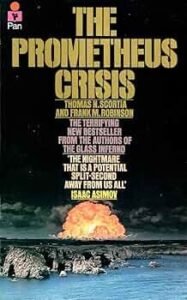The Prometheus Crisis by Thomas N. Scortia and Frank M. Robinson (book review).
Now writers Thomas N. Scortia and Frank M. Robinson wrote ‘The Glass Inferno’ in 1974, and another book, ‘The Tower’ by Richard Martin Stern in 1973, was used for the 1974 film ‘The Towering Inferno’. Whether they wrote ‘The Prometheus Crisis’ on the roll from that or for the publisher in 1976 isn’t given in the introduction.
That concentrates on all the help and facts double-checked to give a realistic account of what would happen in a nuclear meltdown. ‘The China Syndrome’ is mentioned as common knowledge. I checked on the release of the film and novelisation of that name, and that was 1979, so ‘The Prometheus Crisis’ predates it.
The book goes from the inquiry to the events as they originally happened. Cardenas Bay is where the Prometheus Nuclear Plant is being built and is the biggest of its kind. The chief engineer, Greg Parks, needs to delay supplying power after complaining many times that the contractors are using sub-standard materials and risking a meltdown. Unfortunately, the people above him wanted it open in a matter of days for the President to officiate. You can tell from the start things are likely to go wrong.
There’s also the matter of James Seyboldt, the local doctor whose body sunk in the sand on the beach, having been shot in the head. He saw to the local population and did radiation checks at the plant.
When two writers collaborate on a story, it raises questions about their individual contributions. However, with the number of characters in different situations, it’s not difficult to see them dividing the work out even if you’re not sure which. In many respects, it appears that the writers are employing the same tactic they likely used in ‘The Glass Inferno,’ which is also reflected in the film. That is, everyday lives messed up by a big event.
Of course, the inevitable meltdown has to happen, and this story becomes an intense read. I did wonder why this novel was never made into a film, but the technical details might have become a stumbling block. The senate committee chapters become rather telling when Parks is asked to explain something simply and the senator admits he spent more time on the sports field than in a science lab when at university. Considering that this novel is set in the 1970s while describing the future, I doubt that much has changed since then. I say ‘the future’, mostly from the odd reference to a hologram of the site and using digital, neither of which was well-known at the time.
Much time is spent over the fallout and how people had to have their belongings destroyed and themselves shaved because radioactive particles would be in their hair and a heavy scrubbing. The levels of radiation poisoning reduced your odds of living depending on how much contamination you got, which is still valid today. The twist at the end still prompts reflection today.
I’m less sure about the murder/radioactive theft sub-plot, as the story didn’t really need it. Even with the Senate hearing, it was only used to distract from the sub-standard materials used in building the nuclear plant. No doubt other excuses could be found, but I remember a statement from one of the Apollo astronauts on the launchpadstating they were depending on parts bought for price rather than quality, sending them up into space and its dangers. With certain things like nuclear plants and space flight, you can’t take risks with things that risk many people’s lives. The ending still has shock value.
‘The Prometheus Crisis’ is still valid today and well worth your time looking for a copy to have a read. The writers’ focus on the various people involved adds an element of care regarding what happened to them. I felt it became a little rushed towards the end, skipping from the third to sixth day, but that might be down to page count. I suspect the down-tone of the ending would not have sold well to an American film audience at the time or even today. That’s unfortunate. I have nothing against nuclear power as an energy resource, but I do agree that the nuclear plants should be made with the best protection.
GF Willmetts
July 2025
(pub: Pan Books, 1977. 318 page paperback. Price: varies. ISBN: 0-330-25330-1).


